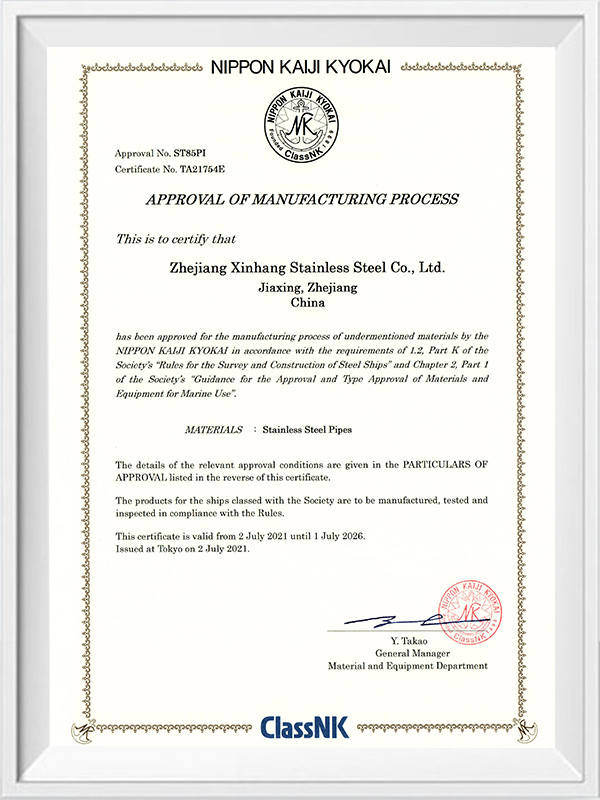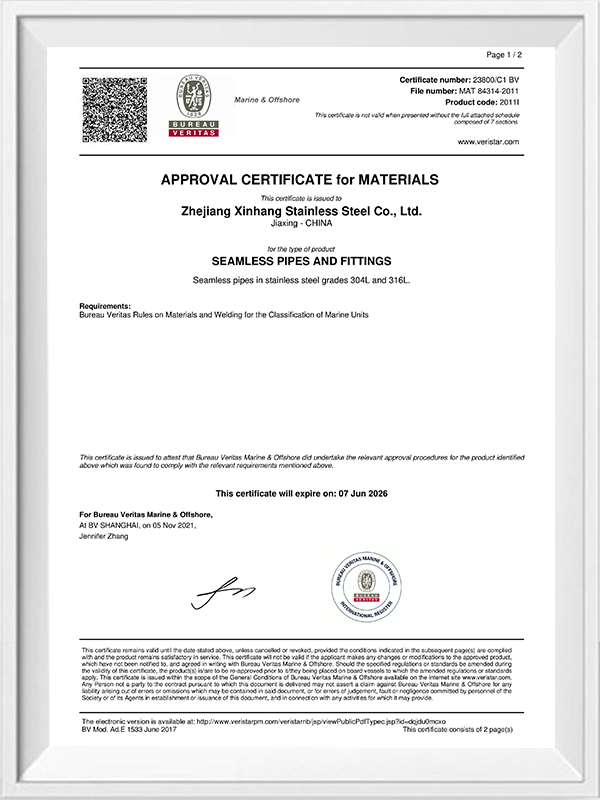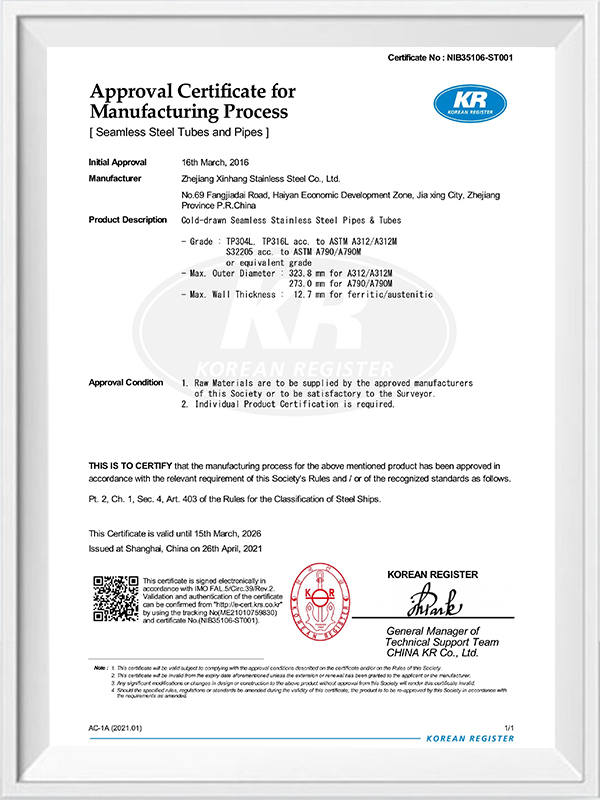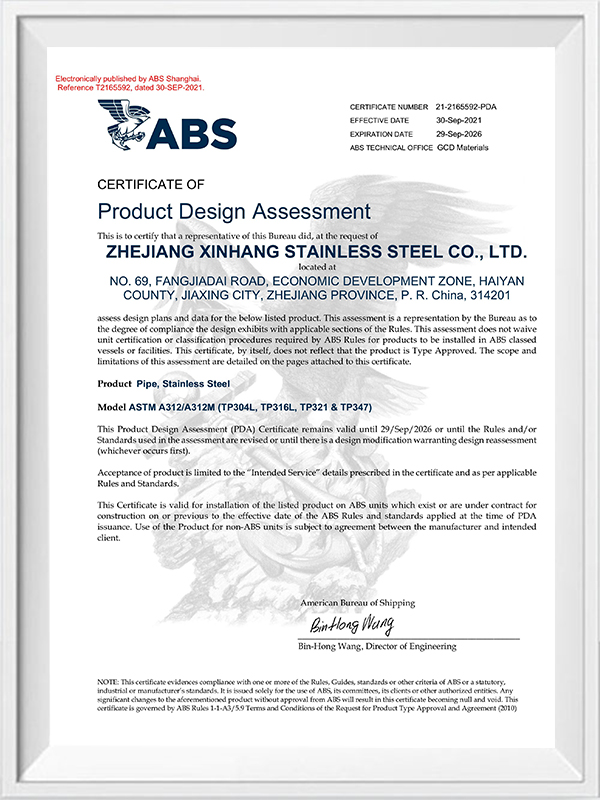

Xinhang Special Material Co., Ltd. Hangzhou Branch is China Stainless Steel instrument tube Suppliers and Stainless Steel instrument tube Factory, founded in 2007 and moved to Longyou Economic Development Zone, Zhejiang Province, in 2022. It covers an area of 130,000 square meters, more than 30 production lines, 300 workers, 20 R&D people, 30 inspection people and an annual output of 50,000 tons.
It has passed ISO9001:2008 quality management system, PED 97/23/EC EU Pressure Equipment Directive certification, China Special Equipment Manufacturing License (Pressure Tube) TS certification, ASME certification, provincial enterprise standardization management system, ISO14000:2004 environment management system, cleaner production (green enterprise), and a series of certifications, as well as China Classification Society (CCS), American Bureau of Shipping (ABS), British Register of Shipping (LR), Deutsche Veritas (GL), Bureau Veritas Society (BV), Det Norske Veritas (DNV), and Korean Register of Shipping (KR) factory certification.
The main products include stainless steel pipes, pipe fittings, flanges, valves, etc., which are widely used in petroleum, chemical industry, nuclear industry, smelting, shipbuilding, pharmaceuticals, food, water conservancy, electric power, new energy, mechanical equipment, and other fields. The company adheres to the corporate tenet of "quality for survival, reputation for development" and wholeheartedly serves every customer to create a win-win situation.




Bottom line: how to weld stainless steel pipe without sugar and leaks For most stainless steel pipe work, the most reli...
View MoreDirect answer: what a “stainless steel pipe pressure rating” really means A stainless steel pipe does not have one univ...
View MoreIn our shop, bending stainless steel pipe is one of those operations that looks simple but punishes shortcuts. Stainless...
View MoreWhat SCH 10 stainless steel pipe specifies (and what it doesn’t) In piping specifications, “SCH” (schedule) is shorthan...
View MoreWhat are the key properties of stainless steel instrument tubes that make them suitable for their intended applications?
Corrosion Resistance: Stainless steel instrument tubes exhibit exceptional corrosion resistance, particularly in harsh environments containing corrosive chemicals, acids, and saltwater. This property ensures longevity and reliability in various industrial settings.
High Strength: Stainless steel is renowned for its strength and durability, allowing instrument tubes to withstand high pressure and mechanical stresses without deformation or failure.
Temperature Stability: Stainless steel maintains its structural integrity across a wide range of temperatures, making it suitable for applications in both high-temperature and cryogenic environments.
Hygienic Properties: Stainless steel is inherently hygienic and easy to clean, making it ideal for use in industries such as pharmaceuticals, food processing, and medical equipment where cleanliness is paramount.
Non-reactivity: Stainless steel is non-reactive with most substances, ensuring that it does not contaminate or alter the composition of the materials it comes into contact with. This property is crucial in sensitive applications such as laboratory equipment and chemical processing.
Aesthetic Appeal: Stainless steel instrument tubes offer a sleek and professional appearance, making them suitable for visible installations in architectural and decorative applications.
Ductility and Formability: Stainless steel can be easily formed into various shapes and sizes, allowing for customization to meet specific design requirements without sacrificing structural integrity.
Longevity and Low Maintenance: Stainless steel instrument tubes have a long service life and require minimal maintenance, reducing downtime and operational costs over their lifespan.
Recyclability: Stainless steel is fully recyclable, making it an environmentally sustainable choice compared to other materials. This property aligns with increasing demands for eco-friendly solutions in various industries.
What are the common challenges or issues faced when working with stainless steel instrument tubes, and how can they be addressed?
Working with stainless steel instrument tubes presents several challenges, but with proper techniques and precautions, these issues can be effectively addressed:
Fabrication Difficulty: Stainless steel is known for its high strength and work hardening properties, which can make it more challenging to fabricate compared to other materials. Proper tools, equipment, and techniques, such as slow and steady machining speeds and sharp cutting tools, can help mitigate this challenge.
Welding Sensitivity: Stainless steel can be prone to welding defects such as distortion, discoloration, and cracking, especially if not welded correctly. Employing suitable welding methods, such as TIG (Tungsten Inert Gas) welding with appropriate filler materials and shielding gases, along with proper pre- and post-weld treatments, can minimize these issues.
Corrosion in Certain Environments: While stainless steel is highly corrosion-resistant, it can still corrode under extreme conditions or in certain aggressive environments. Choosing the correct grade of stainless steel with the appropriate corrosion resistance properties for the specific application, and implementing proper surface treatments or coatings when necessary, can help prevent corrosion.
Surface Contamination: Contamination during handling, fabrication, or installation processes can compromise the corrosion resistance of stainless steel. Implementing strict cleanliness procedures, such as using clean tools and gloves, avoiding contact with carbon steel or other contaminants, and properly passivating surfaces after fabrication, can help maintain the integrity of stainless steel instrument tubes.
Compatibility with Other Materials: When Stainless steel instrument tubes come into contact with dissimilar metals or incompatible materials, galvanic corrosion can occur. Employing proper isolation techniques, such as using dielectric fittings or insulating materials, can prevent galvanic corrosion and ensure the longevity of the system.
Dimensional Stability: Stainless steel can exhibit dimensional changes due to thermal expansion and contraction, which may affect the accuracy of instrument measurements or the fit of components. Designing systems with adequate allowances for thermal expansion, using expansion loops or flexible connections where necessary, and controlling operating temperatures can help maintain dimensional stability.
Cost Considerations: Stainless steel can be more expensive than alternative materials upfront, which may pose cost challenges for some projects. However, considering the long-term durability, low maintenance requirements, and potential savings in lifecycle costs, stainless steel instrument tubes can offer a favorable return on investment over time.
We'll never share your email address and you
can opt out at any time, we promise.